Many who use social media say they regularly see false and misleading content along with new ideas
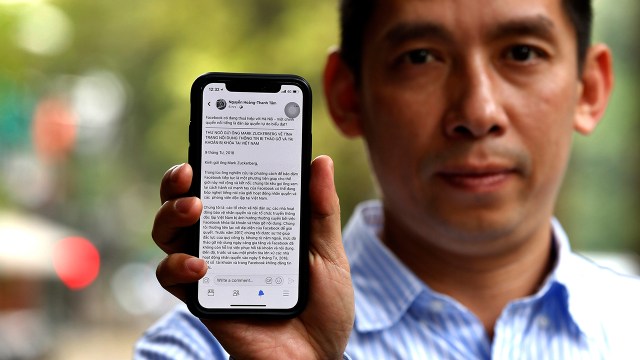
In Vietnam, about half of adults say social media are at least somewhat important for keeping up with political news and other developments. Above, Vietnamese activist La Viet Dung has alleged Facebook may be helping to suppress online dissent.
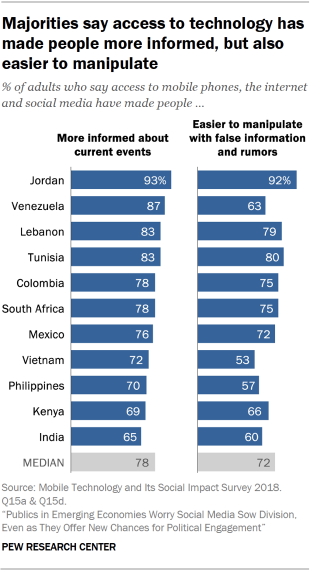
In recent years, the internet and social media have been integral to political protests, social movements and election campaigns around the globe. Events from the
Arab Spring to the worldwide spread of
#MeToo have been aided by digital connectivity in both advanced and emerging economies. But popular social media and messaging platforms like Facebook and WhatsApp have drawn attention for their potential role in spreading
misinformation, facilitating political manipulation by
foreign and
domestic actors, and increasing
violence and
hate crimes.
Recently, the Sri Lankan government shut down several of the country’s social media and messaging services immediately after
Easter day bombings at Catholic churches killed and wounded hundreds. Some technology enthusiasts
praised the decision but wondered if this development marked a change from pro-democracy, Arab Spring-era hopes that digital technology would be a liberating tool to a new fear that it has become
“a force that can corrode” societies. In the context of these developments, a Pew Research Center survey of adults in 11 emerging economies finds these publics are worried about the risks associated with social media and other communications technologies – even as they cite their benefits in other respects. Succinctly put, the prevailing view in the surveyed countries is that mobile phones, the internet and social media have collectively amplified politics in both positive and negative directions – simultaneously making people more empowered politically and potentially more exposed to harm.
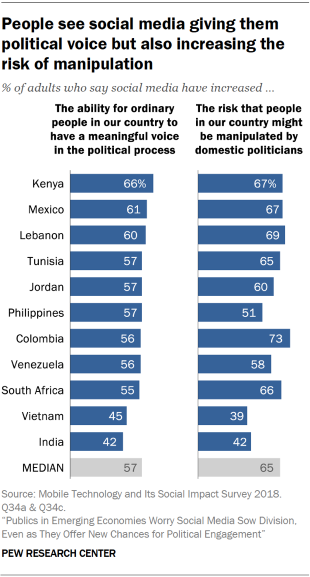
When it comes to the benefits, adults in these countries see digital connectivity enhancing people’s access to political information and facilitating engagement with their domestic politics. Majorities in each country say access to the internet, mobile phones and social media has made people more informed about current events, and majorities in most countries believe social media have increased ordinary people’s ability to have a meaningful voice in the political process. Additionally, half or more in seven of these 11 countries say technology has made people more accepting of those who have different views than they do.
But these perceived benefits are frequently accompanied by concerns about the limitations of technology as a tool for political action or information seeking. Even as many say social media have increased the influence of ordinary people in the political process, majorities in eight of these 11 countries feel these platforms have simultaneously increased the risk that people might be manipulated by domestic politicians. Around half or more in eight countries also think these platforms increase the risk that foreign powers might interfere in their country’s elections.
Similarly, the widespread view that technology has made people more informed about current events is often paired with worries that these tools might make people vulnerable: Majorities in 10 of these countries feel technology has made it easier to manipulate people with rumors and false information. Further, a
recent report by the Center found that a median of 64% across these 11 countries say people should be very concerned about exposure to false or incorrect information when using their phones.
What is a median?
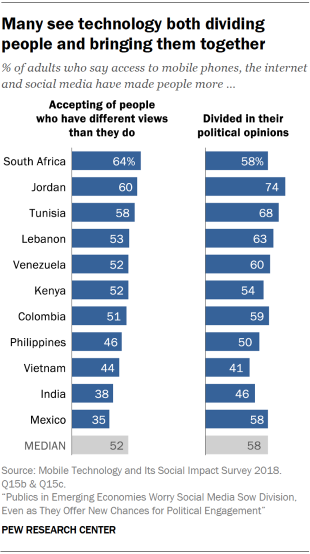
Publics in these countries are also conflicted over the extent to which technology is broadening people’s personal horizons or causing their politics to become more tribal – and many seem to see elements of both. An 11-country median of 52% say technology has made people more accepting of those who have different views than they do, while a median of 58% say it has made people more divided in their political opinions. In most countries, larger shares say technology is causing people to be more divided than say it has caused them to be open to different groups of people.
The public’s opinion is easily manipulated through social media. Videos circulating about politicians can either make them famous and likable or break them down.WOMAN, 23, TUNISIA
Those most attuned to digital technology’s potential benefits are often also most aware of its downsides
It is not simply the case that certain segments of the public have consistently positive views about the political impacts of digital technology while others feel consistently more negative. In many instances, individuals who are most attuned to the potential benefits technology can bring to the political domain are also the ones most anxious about the possible harms.
For instance, in 10 of the 11 countries surveyed, the view that technology has made people more informed is correlated with the view that technology has made people easier to manipulate with rumors and false information. And in most countries, the view that technology has made people more accepting of each other is correlated with the view that it has made people more divided in their political opinions.
The social media landscape in the 11 countries surveyed
Certain groups – such as those with higher levels of education and those who are social media users – are especially likely to note both the positive and negative impacts of technology.
1,
2 Across all 11 countries, adults with a secondary education or higher are more likely to say technology has made people more informed about current events relative to those who do not have a secondary education. Yet, in nine countries, those with higher levels of education are also more inclined to say technology has made people more subject to false information and rumors. More highly educated adults are also more likely to say technology has contributed to both political divisions and tolerance of opposing viewpoints in seven of these countries (Colombia, India, Kenya, Lebanon, the Philippines, Tunisia and Vietnam).
Similarly, social media users in all 11 countries are more likely than non-users to say technology has made people more informed about current events. Users are also generally more likely to say technology has made people more accepting of those with different views, and more willing to engage in political debates. However, users are also more likely to say technology is making people more divided in their political opinions and easier to mislead with misinformation.
The public’s sense that technology brings both promise and problems is mirrored in social media users’ experiences on these platforms
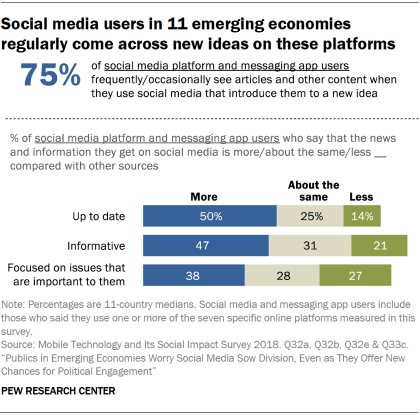
These broad public views about the positive and negative impacts of technology on the political and information environment are echoed in social media users’ lived experiences on these platforms.
In some respects, social media users indicate that the nature of the content on these platforms is quite positive. In every country surveyed, for instance, majorities of social media users say they frequently or occasionally encounter content there that introduces them to new ideas. Similarly, pluralities of social media users in most countries say the news and information they get on these platforms is more up to date and more informative compared with other sources.
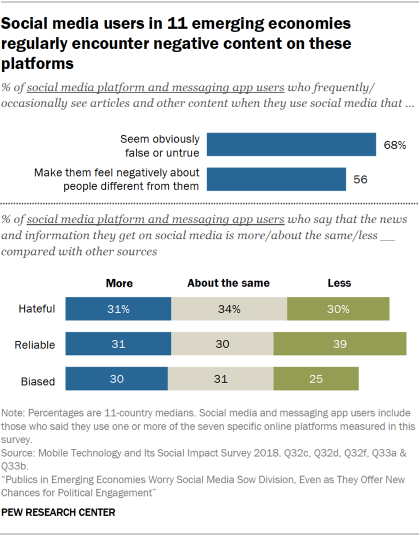
But as was true of views of the overall technology landscape, social media users see challenges as well as benefits. Most notably, majorities of social media users in 10 of these 11 countries frequently or occasionally encounter content that seems obviously false or untrue, and majorities of users in six countries regularly encounter content on these platforms that makes them feel negatively about groups of people who are different than they are.
Social media users also express mixed opinions about the characteristics of the social media environment relative to other information sources. Only in Vietnam do a plurality of users say these platforms are more reliable than other sources they encounter. In other countries, users are more divided about whether the information on social media is about as reliable – or less so – than what they see elsewhere. Opinion is also relatively mixed across the 11 countries as far as whether the news people get on these platforms is more hateful than what they get elsewhere.
We have to understand that there are scores of websites and articles on the internet that are false and inaccurate, purely opinion, or extremely biased or slanted.WOMAN, 22, PHILIPPINES
This range of experiences and attitudes is also reflected in at least some users’ personal interactions on social media platforms. An 11-country median of 36% of social media users – including around half in Kenya and Venezuela – say they have learned someone’s political beliefs were different than they had thought based on things that person posted to social media. In all 11 countries surveyed, those who have been surprised by someone’s political beliefs in this way are more likely to say technology has made people more divided in their political opinions. In seven countries, however, these users are also more likely to say access to technology has made people more accepting of those who have different views.
More people are comfortable talking politics in person than in digital spaces
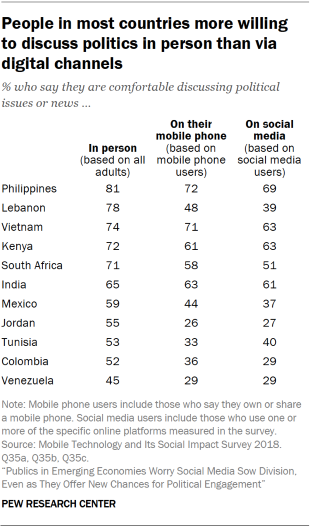
Even as social media have offered citizens new ways to encounter and share information, more people are comfortable speaking about politics in person than via mobile phones or social media. These differences are especially pronounced in Lebanon: 78% of Lebanese overall say they are comfortable discussing political issues in person, but 48% of Lebanese mobile phone users are comfortable discussing these issues on their phones and just 39% of Lebanese social media users say they are comfortable broaching these issues on those platforms.
People who are comfortable discussing politics in digital spaces tend to be more optimistic about the impact these technologies have on politics in their country. For example, social media users who are comfortable discussing politics there are more likely to say the internet has had a good impact on politics and that social media have increased ordinary people’s ability to have a meaningful voice in politics. They also are usually more likely to describe the news they get on social media platforms positively – as more up to date, informative, reliable and focused on issues they care about – compared with other sources. And they are more likely to say they see articles on social media that introduce them to new ideas. But they are also somewhat more likely to say they regularly encounter articles or other content that makes them feel negatively about groups of people who are different from them.
Although publics in most countries are more comfortable discussing politics in person than via digital methods, people in certain countries are generally more comfortable discussing politics – whether in person, using their mobile phone or over social media – than people in other countries. The Philippines, Vietnam, Kenya and India are countries where majorities are comfortable discussing politics in person, and majorities of users are comfortable talking politics on a mobile phone or via social media. However, people’s comfort levels have little relationship with overall measures of
civil liberties in their country or measures of
how democratic the country is (or is not). And countries with higher levels of interpersonal trust are not more likely to be comfortable discussing politics in any of these venues.
3 You know, there’s a politician that sends text messages to us saying ‘Happy birthday, from Senator this-and-that.’ Even with that, they have already got your number. What more [do they have] if you’re already on social media?MAN, 44, PHILIPPINES
These are among the major findings from a new survey conducted among 28,122 adults in 11 countries from Sept. 7 to Dec. 7, 2018. In addition to the survey, the Center conducted focus groups with diverse groups of participants in Kenya, Mexico, the Philippines and Tunisia in March 2018, and their comments are included throughout the report.
Users say they regularly encounter false and misleading content on social media – but also new ideas
By
Aaron Smith,
Laura Silver,
Courtney Johnson,
Kyle Taylor and
Jingjing Jiang Social media use has
increased in emerging and developing nations in recent years. And, across the 11 emerging economies surveyed for this report, a median of 28% of adults say social media are very important for helping them keep up with political news and other developments happening in the world.
Pluralities of social media users in most countries find the information they get on these platforms to be more up to date, informative and focused on issues important to them than what they get from other sources.
4 Large majorities of social media users in most countries also say they regularly see articles and other content that introduce them to new ideas.
At the same time, opinions are divided when it comes to the reliability, bias and hateful nature of social media content when compared with other sources. And when asked about the kinds of material they encounter on these sites, majorities in most countries report at least occasionally seeing content that seems obviously false or untrue or that makes them feel negatively about groups different from them. Across almost all these measures, those who say social media are very important sources of political information see these platforms in different – and often more extreme – terms than other social media users.
Fewer rely on or trust social media for political news than say the same of in-person discussions
Even as social media use
has become more common in many emerging countries, in only four of the 11 countries surveyed do a majority of people say these platforms are an important source of political information – and nowhere does a majority say social media are very important for learning about politics. All told, a median of 28% of adults say social media are very important for helping them keep up with political news and other developments happening in the world.
In every country, many fewer people say social media are very important for helping them keep up with political events than say the same about a more traditional form of social networking – having discussions in person with people they see regularly. In every country but Mexico, a majority says in-person discussions are an important way they stay informed. Around four-in-ten or more in most countries say these conversations are very important.
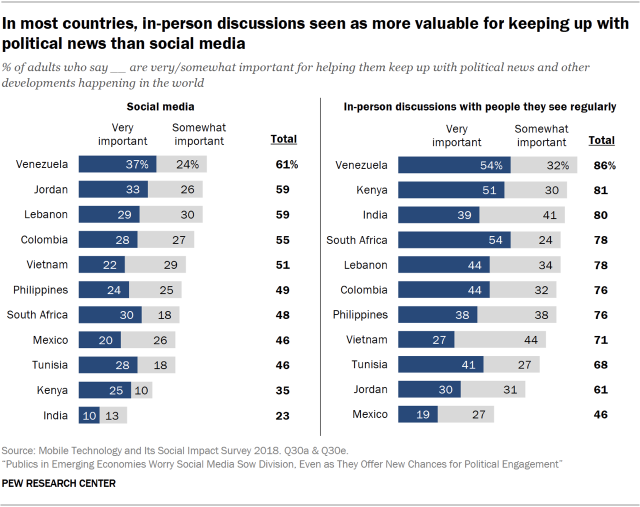
Some of the reason people place less importance on social media might stem from the fact that social media use can
vary widely across these 11 countries – from a low of 31% in India to a high of 85% in Lebanon. But even among those who use these platforms, only in four of the 11 countries surveyed (South Africa, Tunisia, Venezuela and Kenya) do about half or more social media users say these platforms are very important sources for helping them keep up with political news and global happenings.
In every country, younger and more educated people are more likely to say social media are very important to them for political news.
5 However, in many instances this is largely due to high levels of social media adoption among the young and more educated. Among those who say they use social media, people with higher and lower levels of education are equally likely to say these platforms are a very important source of political news in seven of these 11 countries, and the same is true of older and younger social media users in six countries.
If you haven’t watched the news today, at least you can still watch it on Facebook.MAN, 40, PHILIPPINES
Publics in these countries more likely to trust political information from in-person conversations than from social media
More broadly, relatively few adults in these countries say they trust the information they get from social media platforms. Among all adults, a median of 35% trust the political news they get on social media, including a median of just 10% who trust it a great deal. Among the subset of adults in these countries who use social media, an 11-country median of 55% say they trust the information they find on social media at least somewhat – ranging from highs of about seven-in-ten in the Philippines, Kenya, India and Venezuela to lows of less than half in Colombia and Mexico. Few users in most countries trust the news they get on social media a great deal – varying from only 8% of Jordanian social media users to 31% of Kenyan users.
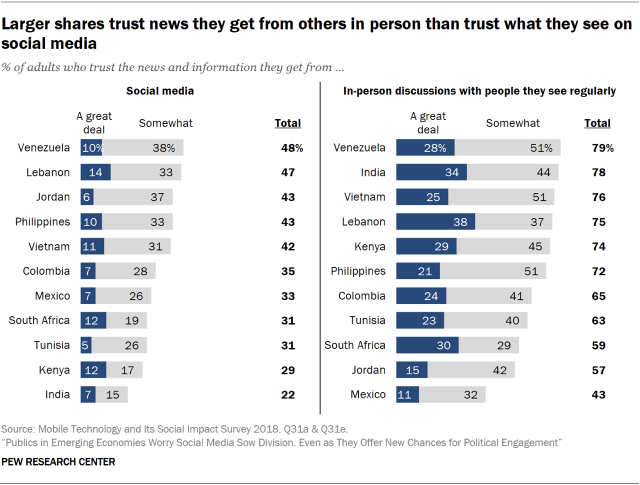
These levels of trust stand out in comparison with the faith people place in the information they gather from face-to-face conversations with people they see regularly. When it comes to in-person conversations, a median of 72% of adults say they trust the information they glean from these discussions, and in eight countries, around a quarter or more say they trust the information a great deal.
Social media users regularly see incorrect information and content that makes them feel negatively about other groups
Social media users report a mix of positive and negative experiences related to the content they see on these platforms. This survey asked about the frequency with which people encounter three specific types of content on social media: content that introduces them to new ideas, that seems obviously false or untrue, or that makes them feel negatively about groups of people who are different from them. Although in no country do a majority of social media users see any of these types of content frequently, in many countries a majority reports seeing all of them at least occasionally.
A median of three-quarters of social media platform and messaging app users say they frequently or occasionally see articles or other content that introduce them to a new idea, ranging from more than eight-in-ten in Tunisia to about half in Mexico. Smaller shares see this content frequently – around four-in-ten or fewer in most countries.
Publics are more likely to say they regularly see content that introduces them to a new idea than to say they regularly see content that seems obviously false or untrue, or that provokes negative feelings toward others. Still, majorities of social media users in most countries surveyed see both at least occasionally, including about two-thirds or more in Tunisia, Lebanon and Vietnam. And very few social media users say they never see content like this: A median of 17% of social media users report never seeing articles that make them feel negatively toward groups of people different from them, and just 8% never see content that appears to be obviously false or untrue.
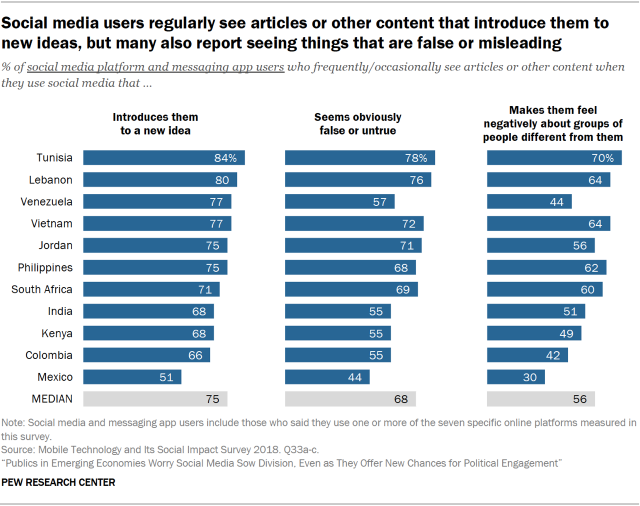
Social media users who access more than one platform are more likely than those who just use a single platform to come across all three kinds of content. The differences are especially large in Lebanon: 83% of Lebanese who access multiple social media sites regularly see articles that seem obviously false or untrue, compared with only about half (48%) of those who use a single site. In Tunisia, on the other hand, access to multiple platforms is not linked with someone’s likelihood of coming across these kinds of content.
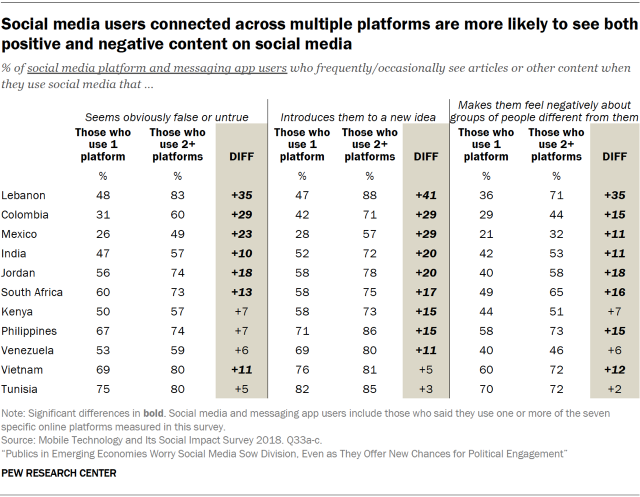
These differences in platform use are themselves related to social media users’ age and education. Older and less educated social media users are more likely to use only one site, while younger and more educated users are more likely to use many. Consequently, younger and more educated social media users are generally more likely to encounter all kinds of content than older and less educated users.
It’s bad enough that websites like Facebook already cocoon users because the author serves you information that he thinks you want to see and hear, based on what you’ve already seen and heard …. Now we learn on top of this, the information may not be true.MAN, 25, PHILIPPINES
Users have mixed opinions about the nature of the content they find on social media
In addition to encountering a mix of positive and negative content on these platforms, social media users in these countries also have mixed opinions about the nature of what they see on social media relative to other information sources. In most countries, larger shares say these social media platforms are more up to date, informative and focused on issues that are personally important to them. But there is much more disagreement over whether these platforms are more reliable, hateful or biased than other information sources.
Pluralities in most countries see social media as more informative than other sources
Pluralities of social media users in most countries surveyed say social media are more informative and focused on issues important to them compared with other sources: Six-in-ten or more in Lebanon and Vietnam say these platforms are more informative, while about half say the same in Venezuela, South Africa, Tunisia and the Philippines. But Mexicans and Colombians take a different view. In these countries, only about a quarter of social media users say these platforms are more informative than other sources, with roughly half saying they are similarly informative.
[Facebook] identifies you and it sends you whatever you like the most. The information is more precise and it corresponds to your personality.WOMAN, 34, MEXICO
Meanwhile, in no country does a majority say the news and information they get on social media is more focused on issues important to them compared with other sources. Instead, many say the news they get on social media is about as focused on issues they care about as other sources, if not less so. Half of Colombian social media users, for example, say the news and information they get on social media is about as focused on issues that are important to them as the news they get elsewhere. And about four-in-ten Kenyan users feel it is less focused on personally relevant issues.
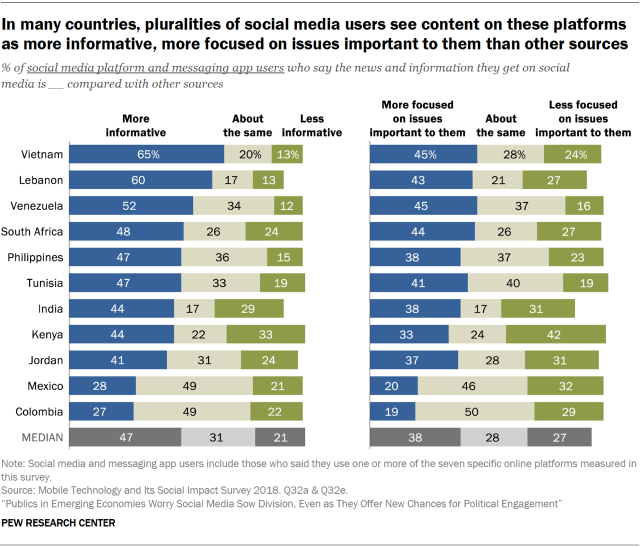
These views are closely related to one another. In every country surveyed, social media users who feel these platforms deliver content that is more personally relevant than other sources are also more likely to say social media are more informative – and the reverse is also true.
More say social media deliver timely material than say the platforms are reliable
In most countries, about half or more social media users say the content they get from social media is more up to date than what they get from other sources. Jordanians, Lebanese, Venezuelans and Vietnamese are especially likely to rate social media as more up to date than other sources, while Colombians are least likely to do so.
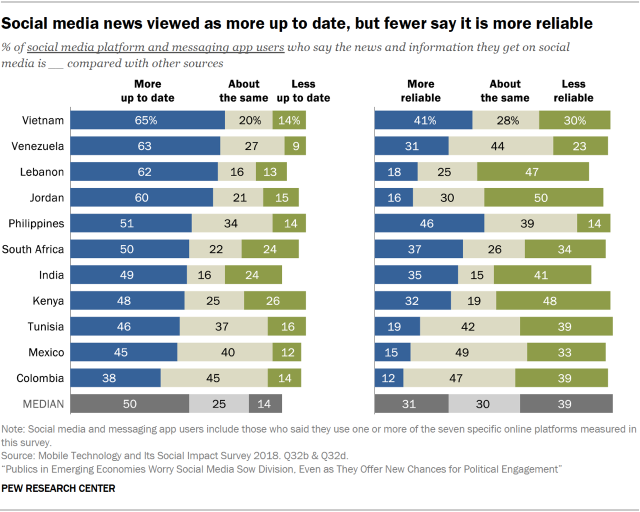
When I compare social media and the media houses, the media houses are more reliable … on social media you find some bloggers who are conveying false information and false news just to hurt other people, or to just lie.MAN, 26, KENYA
By contrast, in each of the 11 countries surveyed, smaller shares say the news and information they get on social media is more reliable than what they get elsewhere. But although relatively few think social media are more reliable than other sources, in no country does a majority think social media are less reliable. Instead, many say that social media are about as reliable as other sources. Only in the Philippines and Vietnam does the largest share of users view these platforms as more reliable than other sources.
In addition, individuals who rate social media positively in one of these respects are also more likely to rate it positively in the other. Those who say the news and information on social media is more up to date are also more likely to say it is more reliable, and vice versa. Consider South Africa: More than half of South Africans (53%) who say social media news is more up to date also say it is more reliable than other sources, and a majority of South Africans who say it is less up to date (55%) say it is less reliable than other sources.
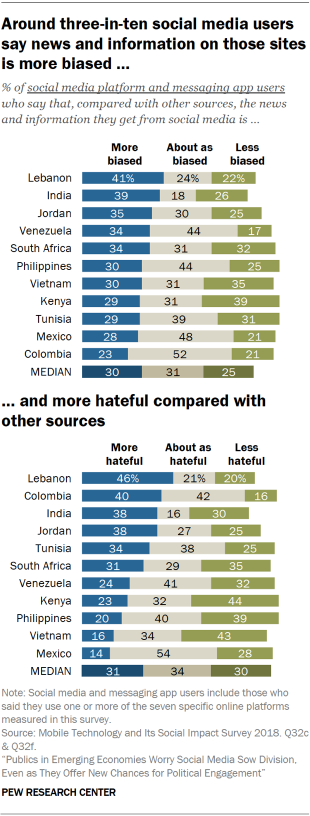
Social media users divided over whether content there is more biased, hateful than other sources
Social media users have mixed views when it comes to the degree of bias they see on social media. Pluralities in five countries – Colombia, Mexico, the Philippines, Venezuela and Tunisia – view content on social media as comparably biased to what they get elsewhere. But in other countries, the balance of sentiment points in different directions: A plurality of Indian and Lebanese social media users say social media content is more biased, while a plurality of Kenyan users say it is less biased.
There is also a nearly even split across countries in people’s views of how hateful the news and information on social media is. A median of 31% say social media content is more hateful than content from other sources, while 30% say it is less hateful and 34% say they are about the same. Four-in-ten or more Lebanese and Colombians see more hateful content on social media than elsewhere, while similar shares of Kenyans and Vietnamese see less.
As with assessments of the timeliness and reliability of social media, views of bias and hatefulness also go together. People who say social media are more biased than other sources are more likely to say these sources are more hateful, and vice-versa.
Before and during the election, there was incitement and violence and social media fueled this. … But the same social media brings togetherness and peace in this country.MAN, 26, KENYA
These attitudes vary only modestly by age and educational attainment. Larger shares of social media users with a secondary education or more say social media are more biased and hateful than other sources in Colombia, India and Mexico, but these assessments do not vary by educational attainment in the other countries surveyed. And age-related differences are even less common. Only in Mexico, Kenya and Vietnam do those ages 50 and older and those under 30 differ in their views of the bias on social media, and only in India do they differ when it comes to hatefulness.
Those who view social media as a very important source of political information tend to have more positive views of these platforms
Across many of these attributes, those who say social media are very important for helping them get political information stand apart from social media users who do not say these platforms are very important political news sources. They are more likely than other social media users to call the news and information they get on social media more informative, timely, reliable and focused on issues important to them than other users in every country but Venezuela. In eight countries, they are more likely to call the information they get from social media more biased compared with other sources. But when it comes to the potentially hateful nature of news on social media, in most countries, social media users tend to view news on these platforms in similar terms.

More people are comfortable discussing politics in person than on their phones or via social media
By
Aaron Smith,
Laura Silver,
Courtney Johnson,
Kyle Taylor and
Jingjing Jiang Some people in the 11 countries surveyed stand out for their comfort discussing politics in a variety of venues – whether face-to-face, via mobile phone or on social media. In general, those who identify with a political party, younger people and those with higher levels of education tend to be more comfortable discussing political news and issues, regardless of the way in which the discussions take place. But in most countries, more people are comfortable talking about political issues and news face-to-face, rather than digitally.
You can comment on something [on social media] – maybe a product. But politically, there is some fear of posting things. I don’t think we are free to say something politically.WOMAN, 35, KENYA
Those who do feel comfortable discussing politics via mobile phone or on social media tend to be more positive about the influence digital technologies have on politics and tend to say social media are a very important source in their lives for acquiring political news and information. People who are comfortable discussing politics on social media are also more likely to say the news they get there is more informative, up to date, reliable and focused on issues they care about compared with other sources.
More prefer in-person conversations about politics to discussions on mobile phones or social media
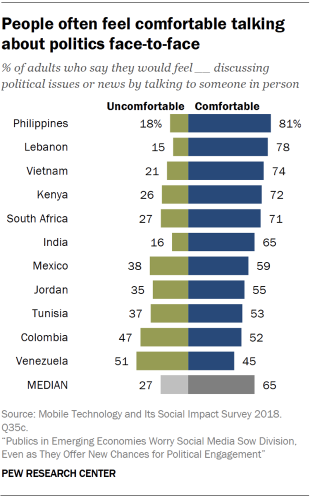
In nearly all of the emerging economies surveyed, more than half of adults say they feel comfortable discussing political issues or news by talking to someone in person. This feeling is most widespread in the Philippines, Lebanon, Vietnam and Kenya, where about three-quarters or more say they would feel comfortable talking about politics face-to-face. The only country where fewer than half say they are comfortable talking about politics in person is Venezuela: 51% say they would not be comfortable discussing politics face-to-face, while 45% say they would be comfortable doing this.
Both politics and religion are controversial to even consider talking [about], so you’d better spare yourself the trouble.WOMAN, 39, MEXICO
In 10 of the 11 countries surveyed, people who are comfortable discussing politics in person are far more likely to describe these discussions as very important for helping them keep up with political news and other world developments. They are also more likely to trust the news and information they get from these face-to-face discussions. In Lebanon, for example, the vast majority (84%) of people who are comfortable talking about politics face-to-face say they trust the information they get from in-person discussions, compared with only 42% of those who say they don’t feel comfortable engaging in such discussions.
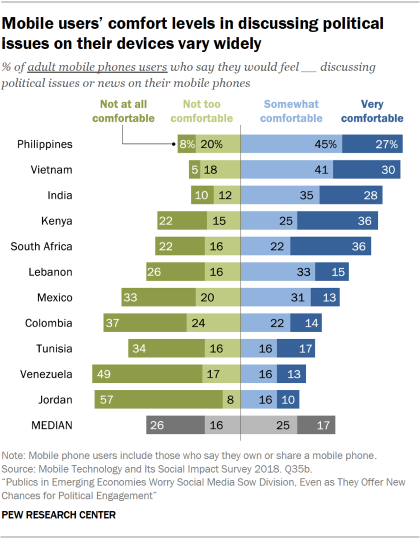
But although majorities of adults in most of the countries surveyed say they feel comfortable discussing politics in face-to-face settings, people are often less likely to feel comfortable talking about these issues on their mobile phones. Across the 11 countries, Filipinos are the most comfortable with using their mobile phones to discuss political issues: 72% of Filipino mobile phone users say they’d be comfortable doing so, including around a quarter who would be very comfortable.
Majorities of mobile users also say they would be comfortable discussing politics on their phone in Vietnam, India, Kenya and South Africa. Other publics stand out for their apprehension in using mobile phones to discuss political issues or news. Majorities of mobile users in Venezuela, Jordan and Colombia say they would be uncomfortable talking about politics with someone via mobile phone, with Jordanians feeling particularly strongly: A majority of the country’s mobile users (57%) say they would be not at all comfortable discussing politics on their phones. About half of Venezuelan mobile users (49%) also say they would not feel comfortable at all discussing politics via mobile device.
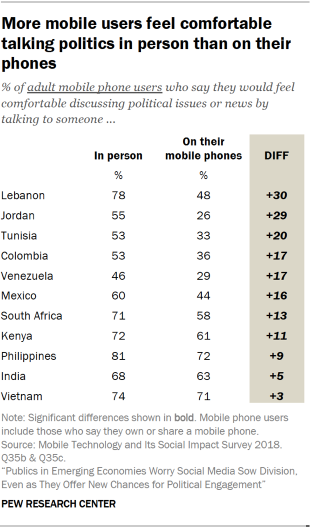
In every emerging economy surveyed, mobile phone users are more likely to say they would be comfortable talking about politics in person than on their mobile phones. In Lebanon, for example, a majority of mobile users (78%) say they would be comfortable talking about politics with someone in person, but only about half (48%) say they would be comfortable doing so on their mobile phones. In nearby Jordan, a similarly large gap is seen.
In 10 of the 11 countries surveyed, people who are comfortable discussing politics on their mobile phones are more likely to say mobile phones have had a good influence on politics. In the Philippines, for example, a majority of mobile users who are comfortable discussing politics on their phone (57%) say these devices have had a good influence on politics, compared with just 42% of those who are uncomfortable talking about politics on their phone.
Substantial variation across countries in people’s willingness to discuss political topics on social media
Country to country, social media platform and messaging app users vary widely in their comfort discussing political issues or news on social media.
6 Again, Filipino users (69%) are the most likely to say they would feel comfortable discussing politics on social media. Majorities of users also say they would be comfortable discussing politics on social media in Vietnam, Kenya and India.
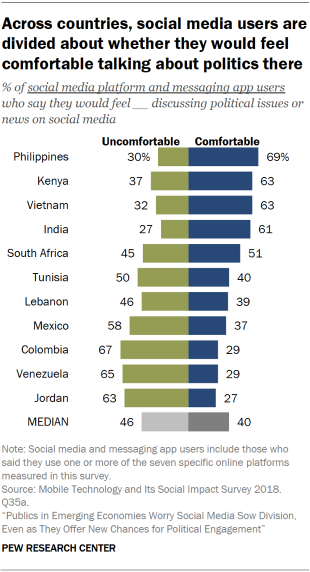
Jordanians, Venezuelans and Colombians – who are the most likely to feel uncomfortable talking about politics on mobile phones – also stand out for their hesitancy to discuss politics on digital platforms. More than six-in-ten social media users in these countries say they would not be comfortable discussing politics on social media. A majority of Mexican users (58%) also say they would be uncomfortable discussing political news and issues on social media. Users in South Africa, Tunisia and Lebanon are somewhat divided over whether they would be comfortable discussing politics on social media platforms.
As was the case with mobile phones, social media users are more likely to say they would feel comfortable discussing politics face-to-face than on social media. For example, 78% of Lebanese social media users say they would be comfortable talking about political issues with someone in person, but just 39% say they would be comfortable doing this on social media.
If you express your political opinion on social media, it could impact your work life. You might get in trouble for that. That’s why we prefer to remain neutral.WOMAN, 29, TUNISIA
People who are comfortable talking about politics on social media tend to feel more positively about the internet’s impact on politics more broadly in nine of the 11 countries surveyed. And no matter the medium of conversation – face-to-face, mobile phone or social media – people who identify with a political party, younger people and those with higher levels of education tend to feel more comfortable discussing political news and issues (see
Appendix C for detailed tables).
78 Meanwhile, men in Colombia, Mexico, South Africa and Venezuela report feeling more comfortable talking about politics than women, regardless of the setting.
Majorities have not been surprised by someone’s political views on social media or blocked a person for political reasons
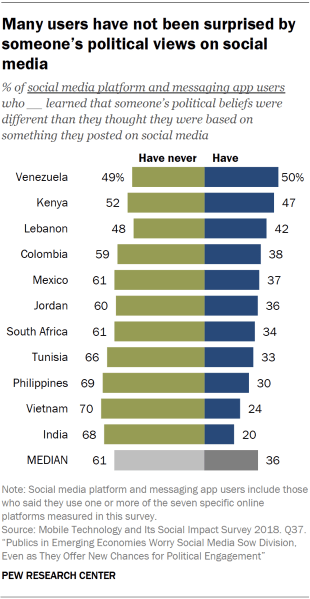
In most countries, a minority of social media and messaging app users say they have learned that someone’s political beliefs were different than they originally thought because of something that person posted to social media. Venezuelans and Kenyans stand out as the two publics where around half of social media users say they have learned someone’s political beliefs are different than they originally assumed. By comparison, a
2016 survey of U.S. adults found that half of social media users had been surprised by someone’s political views based on their social media posts.
More-educated social media users are more likely to say they have been surprised by someone’s political views on social media. To a lesser degree, age and gender play a role in some countries; younger social media users and male users are more likely to have been surprised.
And in Colombia, India, South Africa, Lebanon and Tunisia, people with partisan identifications are more likely than those who say no party represents them to say they have been surprised by someone’s political views on social media. In six of the 11 countries, people who are comfortable engaging in political discussions on social media are also more likely to have been surprised by someone’s beliefs.
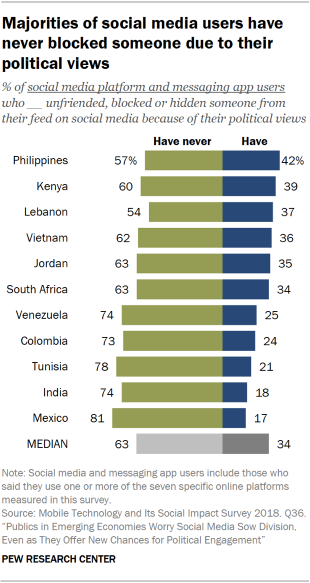
Meanwhile, modest shares of social media and messaging app users (median of 34%) say they have unfriended, blocked or hidden someone from their social media feed because of their political views. Blocking another social media user because of his or her political views is most common in the Philippines (42% of users) – the country where users are most likely to say they feel comfortable discussing politics via social media. And in every country surveyed, people who say they’ve been surprised by someone’s political views on social media are more likely to have blocked someone. In Jordan, Lebanon, the Philippines and South Africa, younger social media users (ages 18 to 29) are more likely than users 50 and older to have blocked someone because of their political views. In five of the countries surveyed – and particularly in Jordan (by 18 percentage points) – male social media users are more likely to have blocked people than female users. But in most countries, partisans are no more likely than nonpartisans to have blocked someone.
One of my colleagues at work shouted at me when I expressed my opinion. He deleted me from Facebook because we do not have the same mentality.
WOMAN, 45, TUNISIA
Publics think technology impacts the political environment in both positive and negative ways
By
Aaron Smith,
Laura Silver,
Courtney Johnson,
Kyle Taylor and
Jingjing Jiang Beyond their views of the personal impact of various technologies, publics in these countries are divided over how the internet in general has impacted politics in their societies. An 11-country median of 44% say the increasing use of the internet has had a good impact on politics, but 28% feel that impact has been largely bad – and this balance of opinion is most negative in Tunisia, Jordan and Lebanon.
Adults in these countries also feel access to technology has had a variety of both positive and negative impacts on their fellow citizens. On the positive side of the ledger, a median of 78% say access to the internet, mobile phones and social media has made people more informed about current events. And when asked about the impact of social media on the broader political process, majorities in nine of these 11 countries say they have increased the ability for ordinary citizens to take part in the political process.
At the same time, an 11-country median of 72% say these technologies have made people easier to manipulate with rumors and false information. And majorities in eight countries say social media have increased the risk that citizens might be manipulated by domestic politicians.
Mixed attitudes about the internet’s overall impact on politics
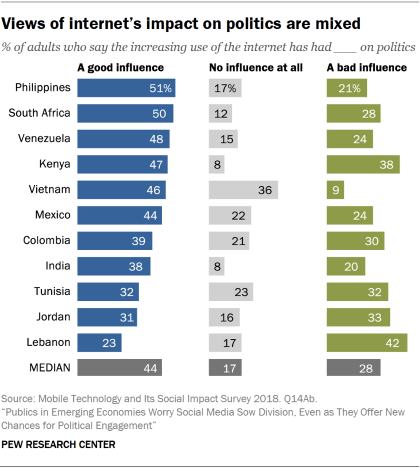
Adults in these countries express mixed views about the overall influence of the internet on politics. In
most countries, larger shares say the internet has had a good impact on politics than say the same about issues such as children or morality. But notably smaller shares say the internet has had a good impact on politics than say this about its effect on issues such as education, the economy or local culture (for more, see the
first report in this series).
Adults in these countries also make little distinction between the impact of the internet and mobile phones when it comes to politics. Nearly identical shares say the internet and mobile phones have had a good, bad or negligible impact on politics.
People who themselves use the internet are somewhat more upbeat than non-users about its effect on politics.
9 And in most of these countries there are only modest to nonexistent differences in attitudes between older and younger adults. But those who describe social media as a very important source of political news for them, personally, are more likely to say the internet has had a good impact on politics relative to those who say social media are less important, or to those who do not use social media at all.
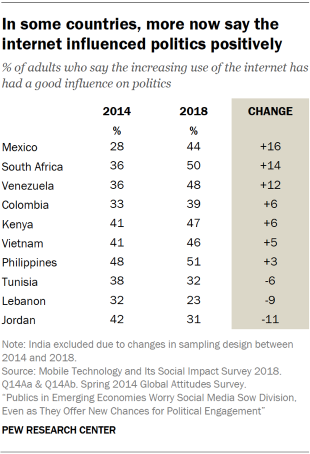
Across these 11 countries, public opinion about the internet’s impact on politics is most negative in Jordan, Lebanon and Tunisia. In Lebanon, nearly twice as many say the internet has had a bad (42%) rather than good (23%) influence on politics. And in Jordan and Tunisia, the shares saying the internet’s impact on politics has been good are comparable to the shares saying it has been bad.
In addition to having a comparably negative balance of sentiment relative to the other countries in this survey, publics in these three countries have also turned somewhat less upbeat in recent years in their assessments of the internet’s impact on politics. From 2014 to 2018, the share of adults in these countries saying the internet has had a good influence on politics has declined by 11 percentage points in Jordan, 9 points in Lebanon and 6 points in Tunisia. By contrast, sentiment in the other seven countries for which trends are available either grew more positive or stayed largely the same over that time. This positive shift has been most pronounced in Mexico, South Africa and Venezuela.
Many think technology has made people better informed – but also easier to manipulate
When asked about the impact of mobile phones, the internet and social media on various political behaviors and attitudes, people in these nations tend to express seemingly dual views of how technology has brought “more” to society: that it has made people more informed, yet more manipulatable; more divided, yet sometimes more accepting of others.
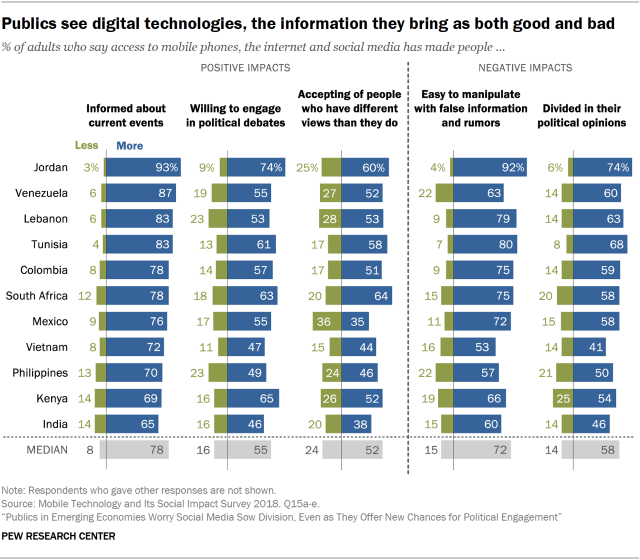
At one level, publics in these countries believe that technology simultaneously makes people more informed and more gullible. Majorities in every country – and an 11-country median of 78% – say access to technology has made people more informed about current events. At the same time, majorities in every country except for Vietnam – and an 11-country median of 72% – say technology has made it easier to manipulate people with false information and rumors.
We become numb to the news, like the presidential campaigns in Mexico. A term ago, we were struggling to get more political awareness, and now everything is made a meme and laughed at. It defeats the purpose of the internet.MAN, 28, MEXICO
The survey highlights similar tensions over whether these technologies make people more divided or more accepting of others. A median of 58% say access to mobile phones, the internet and social media has made people more divided in their political opinions. At the same time, a median of 52% say these technologies have made people more accepting of those who have different views than they do. And a median of 55% say they have generally made people more willing to engage in political debates.
These positive and negative views of technology’s impact on political attitudes are often related. In 10 of the 11 countries surveyed, those who believe technology has made people more informed are more likely than others to say technology has also made people easier to manipulate.
Similarly, in most countries those who say technology has made people more accepting of diverse viewpoints are simultaneously more likely to say it has made people more divided in their political opinions.
Through our mobile phones, since there is that social media, it has really led to the spread of hatred and tribalism amongst ourselves.MAN, 38, KENYA
These same costs and benefits are visible when it comes to technology’s impact on political news and discussion. For instance, people in these countries
overwhelmingly feel mobile phones have improved people’s ability to obtain news. Yet an 11-country median of 64% say people should be very concerned about exposure to false information when using their mobile devices.
People in some countries stand out for their views on the influence of technology on politics
Especially large shares of Jordanians feel technology has made people more receptive to most of the political impacts measured in the survey, and this is especially true of the notion that technology makes people more informed but also easier to manipulate. Around nine-in-ten Jordanians say access to mobile phones, the internet and social media has made people more informed about current events, but a similar share says this access makes them more vulnerable to being manipulated with rumors and false information. And roughly three-quarters of Jordanians say technology has made people more divided in their political opinions, but also more willing to engage in political debates.
By contrast, Vietnamese adults are relatively likely to say access to these technologies hasn’t changed much compared with those in the other countries surveyed. One-third or more Vietnamese say these technologies haven’t had much impact on people’s willingness to engage in political debates (33%), how divided they are in their political opinions (35%) or how accepting they are of those with different views (35%), while 26% say they haven’t had much impact on how easy people are to manipulate. In each instance, these represent the largest shares among the 11 countries surveyed.
Meanwhile, Mexicans stand out for their assessment of the impact of technologies on people’s tolerance of different viewpoints. Some 35% of Mexicans say technology has made people more accepting of people who have different views than they do, but a nearly identical share (36%) says technology has had a negative impact in this regard. Younger Mexicans are especially likely to say technologies have made people less tolerant to people who hold different views: 41% hold this view, compared with 30% of Mexicans ages 50 and older.
Social media users, those affiliated with a political party and the more educated are more likely to see both positive and negative political impacts of digital technologies
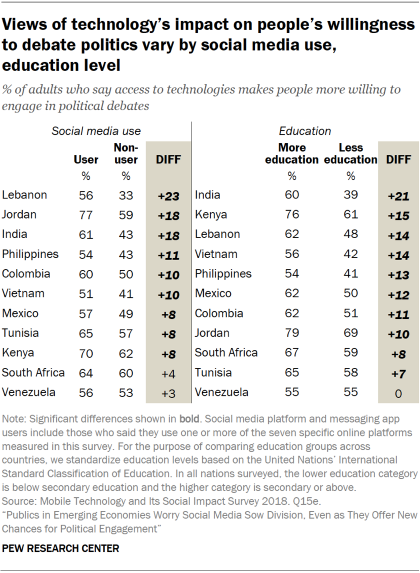
Certain groups are especially likely to cite both the positive and negative impacts of technology on political engagement.
For example, social media users are more likely than non-users to say technology has made people more informed about current events in all 11 countries surveyed; more accepting of people with different views in eight countries; and more willing to engage in political debates in nine countries.
10 At the same time, in nine countries a larger share of users say technology is making people more divided in their political opinions – and in 10 countries a larger share of social media users say technology is making people easier to mislead with misinformation (see
Appendix C for detailed tables).
These attitudes also vary by education level.
11 Across all 11 countries, adults with a secondary education or higher are more likely to say technology has made people more informed about current events relative to those who do not have a secondary education. And in nine countries, adults with higher levels of educational attainment are more inclined to say technology has made people more subject to false information and rumors.
Meanwhile, adults with higher levels of educational attainment are more likely to say technology has contributed to both political divisions and tolerance of opposing viewpoints in seven of these countries (Colombia, India, Kenya, Lebanon, the Philippines, Tunisia and Vietnam).
In eight of the nine countries for which partisan information is available, those who have a partisan affiliation are somewhat more likely than those who don’t identify with any particular party to say technology has made people more willing to engage in political debate.
12 And in five of those countries, those with a partisan affiliation are more likely to say access to technology has made people more divided in their political opinions. But in most countries, similar shares of the affiliated and unaffiliated say technology has made people more informed, more accepting of those with different viewpoints and more susceptible to misinformation.
13 Lastly, social media users’ assessments of the impact of technology on political attitudes are somewhat related to whether they view social media as an important news source. In seven out of the 11 countries, those who say social media are a very important news source for them to get political news and information are more likely than users who do not think social media are as important to say technology has made people more informed about news and current events.
Social media seen to confer benefits – but also risks – on the overall political process
When asked about different impacts social media have had on their country’s political process, publics in these countries are more likely than not to say social media offer new avenues for political engagement. A median of 57% – and majorities in every country except for Vietnam and India – say social media have increased the ability for ordinary people in their country to have a meaningful voice in the political process. And a median of 53% say these platforms have increased the ability of nongovernmental organizations to promote their causes.
But these perceived benefits from social media are matched with perceived costs. An 11-country median of 65% say social media have increased the risk that people in their country might be manipulated by domestic politicians. And when asked whether these platforms might facilitate foreign interference in their country’s elections, a median of 55% say these platforms have indeed increased this risk – although a median of 27% feel they have not had much effect either way.
Now it is much easier for our countrymen to know about the plans of our government for our OFW [Overseas Filipino Workers].WOMAN, 48, PHILIPPINES
Among those who use social media, there are only minimal differences between the views of younger (ages 18 to 29) and older adults (those ages 50+) on these questions. However, there are some differences based on how extensively people rely on these platforms for information. In most countries, those who say social media are a very important news source are more likely to say these platforms have increased ordinary people’s ability to have a meaningful voice in politics, and that they have helped nongovernmental groups to promote their causes. At the same time, in seven countries this group is also more likely to say these platforms have increased the risk of people being manipulated by domestic politicians, compared with users who do not see social media as a very important source of information.
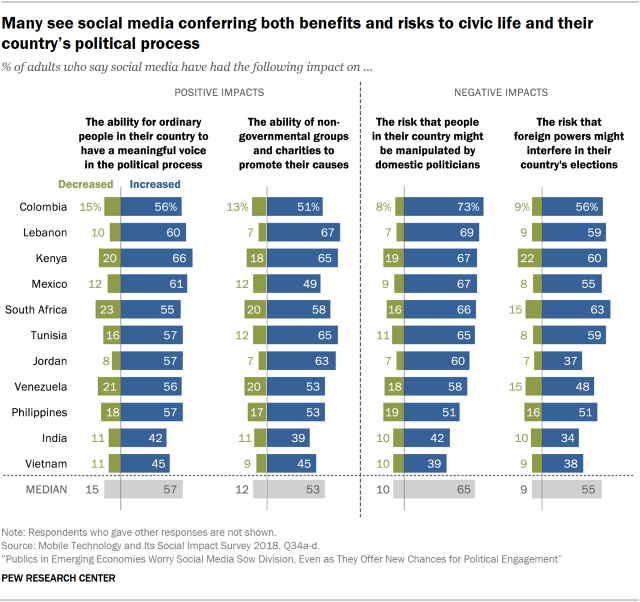
In several countries, sizable shares say they do not know how these platforms have impacted the broader political system
These questions were asked of all adults – regardless of whether they themselves use social media platforms or not. And in several of these countries, sizable shares of those who do not use any social media platforms are unable to offer an opinion on how social media have impacted these aspects of the political process. This is especially true in Jordan, Lebanon, India and Vietnam. Among people in these countries who do not use social media, as many as 21% of Vietnamese, 34% of Jordanians, 41% of Lebanese and 51% of Indians either do not know the answer to these individual questions or refused to offer a guess.
Similarly, demographic groups who use social media at low rates (such as older adults or those with lower levels of education) are often more likely to say they do not know how social media have impacted these elements of the political process.


/s3.amazonaws.com/arc-wordpress-client-uploads/infobae-wp/wp-content/uploads/2019/05/10234218/google.jpg) El derecho al olvido rige en Europa
El derecho al olvido rige en Europa /s3.amazonaws.com/arc-wordpress-client-uploads/infobae-wp/wp-content/uploads/2018/04/17100913/derecho-al-olvido-google-770.jpg) Según datos recopilados y publicados por Google, los usuarios europeos reclamaron que se retiren 3.129.077 direcciones, de las cuales ya se han borrado el 44,6 por ciento
Según datos recopilados y publicados por Google, los usuarios europeos reclamaron que se retiren 3.129.077 direcciones, de las cuales ya se han borrado el 44,6 por ciento El presidente estadounidense, Donald Trump, reiteró hoy su defensa a su escalada en la guerra comercial con China como una buena política económica, al tiempo que Pekín anunció sus planes de tomar represalias contra el último movimiento de Washington de aumentar los aranceles de los productos chinos.
El presidente estadounidense, Donald Trump, reiteró hoy su defensa a su escalada en la guerra comercial con China como una buena política económica, al tiempo que Pekín anunció sus planes de tomar represalias contra el último movimiento de Washington de aumentar los aranceles de los productos chinos. La industria metalmecánica una de las más golpeadas
La industria metalmecánica una de las más golpeadas 
 Trump da la bienvenida a Orbán a la Casa Blanca.
Trump da la bienvenida a Orbán a la Casa Blanca. 


























